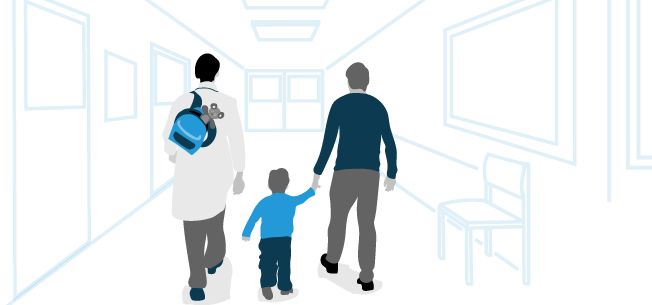- What is Hunter syndrome?
Hunter syndrome is a rare, genetic disorder that results in a lack of a specific enzyme, iduronate-2-sulfatase. This enzyme is needed to break down substances in the body called glycosaminoglycans (GAG). Since patients with Hunter syndrome cannot break these substances down, the GAGs gradually build up in most of the organs in the body and can damage them. This causes a range of disease-related signs and symptoms, including diminished lung function and decreased walking capacity. Ask your doctor about where to find more information about Hunter syndrome.
- What is ELAPRASE?
ELAPRASE is a prescription medicine for patients with Hunter syndrome. ELAPRASE has been shown to improve walking ability in patients 5 years and older. In patients 16 months to 5 years old, ELAPRASE did not show improvement in disease-related symptoms or long term clinical result; however, treatment with ELAPRASE has reduced spleen size similarly to patients 5 years and older. It is not known if ELAPRASE is safe and effective in children under 16 months old.
It is a type of enzyme replacement therapy intended for Hunter syndrome patients who are unable to produce enough of the iduronate-2-sulfatase enzyme themselves.
Click here to learn more about ELAPRASE.
- Why does the ELAPRASE Prescribing Information say that "In patients 16 months to 5 years of age, no data are available to demonstrate improvement in disease-related symptoms or long-term clinical outcome"?
A clinical trial in patients aged 5 years and older evaluated walking capacity and lung function, which are considered to be disease-related symptoms, and a 2-year extension study was carried out to gather longer-term data. These symptoms were not evaluated in the trial that included patients aged 16 months to 7 years.
Click here to learn more about ELAPRASE clinical trial data.
- Why does the Prescribing Information say that "The safety and efficacy of ELAPRASE have not been established in pediatric patients less than 16 months of age"?
The clinical trials that studied ELAPRASE only included patients aged 16 months and older.
Click here to learn more about ELAPRASE clinical trial data.
- Is ELAPRASE a new medication?
No, ELAPRASE has been FDA-approved for use in the U.S. since 2006. ELAPRASE has also received marketing authorization in many other countries; ELAPRASE has been approved in 77 other countries after receiving respective marketing authorizations and so is available to patients around the world. Indication and risk information may vary by country.
- How is treatment with ELAPRASE administered?
ELAPRASE is administered intravenously (by infusion into a vein) once a week, by a trained healthcare professional.
Click here to learn more about how ELAPRASE is administered.
- Why does the dose of ELAPRASE given vary over time?
The dose of ELAPRASE given depends on the patient's weight, so you or your child should be regularly weighed to calculate the optimal dose.
Click here to learn more about how ELAPRASE is administered.
- What are the side effects of ELAPRASE?
Allergic reactions, including life-threatening anaphylaxis, have occurred in some patients treated with ELAPRASE. Anaphylactic reactions include breathing problems, low oxygen levels, low blood pressure, hives, and/or swelling of the throat or tongue. Inform your healthcare provider immediately if you notice the appearance of any of these symptoms.
In clinical trials, the most common side effects occurring in at least three patients aged 5 years or older were headache, itching, muscle and bone pain, hives, diarrhea, and cough. Among patients aged 7 years or younger, the most common adverse reactions occurring in at least three patients were fever, rash, vomiting, and hives.
Click here for more about the ELAPRASE risk and safety profile.
Click here to read the Important Safety Information.
- Should the ELAPRASE infusion be postponed if you are unwell?
Inform your healthcare team of any illness prior to the ELAPRASE infusion, and they will decide whether or not to delay the ELAPRASE infusion.
If you or your child has breathing problems, a fever, or a respiratory illness, you or your child may be at risk of life-threatening complications as a result of potential allergic reactions caused by ELAPRASE. Your healthcare team should be advised of these conditions before treatment with ELAPRASE because the information may affect the timing of ELAPRASE treatment.
If you or your child has breathing problems, other respiratory illness, heart problems, or susceptibility to fluid overload, you or your child may be at higher risk of fluid overload during ELAPRASE treatment. Your healthcare team should be advised of these problems before treatment and you should confirm with your healthcare team in advance of treatment that members are appropriately trained to watch for signs of fluid overload and provide the necessary medical support. Patients at risk for fluid overload may require longer observation time.
Click here for more about the ELAPRASE risk and safety profile.
Click here to read the Important Safety Information.
- What is Takeda Patient Support and how can it help me?
When you’re prescribed ELAPRASE, Takeda Patient Support is here for you. Our support specialists can address your questions and concerns and help get you the answers, resources, and tools you need.
Click here for more information about Takeda Patient Support product services.
Click here to go to TakedaPatientSupport.com.
- How can I find out if I can switch to home infusions?
Please speak to your doctor about home infusions. Patients who tolerate ELAPRASE infusions well may be able to receive infusions at home under the supervision of a healthcare professional.


